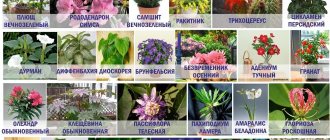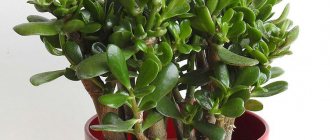If you want to liven up your apartment and create a feeling of celebration in it, the surest way is to decorate it with flowers. Cut bouquets do not last long, starting to fade after just a few days, and artificial ones look unnatural. It is best to grow indoor flowering plants at home, photos with names of which you will find in this section.
Cyclamen
What indoor plants must be in the house?
Indoor plants are not just an element of beautiful decor. Each of them has a certain energy. The presence of fresh flowers indoors has a beneficial effect on the health of the inhabitants. Like any green space, houseplants can reduce the content of toxic substances and saturate the room with oxygen. But among them there are some that are not recommended to be kept in the house.
Unpretentious plants that should be in every home
Houseplants that are good for home and family
Living plants in the house can bring luck and wealth to the owners, bring the family together, give peace and mutual understanding. Indoor flowers that should be in every home:
- Money Tree. It got its name from the leaf shape that resembles a coin. Helps ensure prosperity and stable income in the home.
- Geranium. Has a slightly unpleasant odor. But it reduces all negative emotions to zero. If a person is not in the mood, then it is worth spending very little time near the geranium in order to be in a good mood again.
- Aloe is the key to friendly relations between all family members. Helps to show warm feelings towards others.
- Bamboo will ensure the longevity of the inhabitants of the house. Eliminates negative energy and gives positive emotions.
- Ficus. Able to cleanse the house of negative energy. A place for it is chosen in the hallway. Here he stands guard and suppresses the evil intentions of people coming to the house. However, if you place it in the bedroom, disagreements may arise between the spouses.
Plants in the apartment are a beautiful addition to the interior
- Violets encourage philosophical reasoning. Helps you make the right decision in various situations.
- Ivy helps to suppress grievances and envy of household members themselves and increase their self-esteem. It gives you confidence in your abilities.
- Chinese rose is the key to romanticism and creativity, suppresses laziness. It makes women independent and helps men become more masculine.
- Monstera puts your mind in order and helps you look at things soberly. In addition, it promotes health.
- Citrus plants soothe and reduce depression. Children's thirst for knowledge increases.
Flowers for home well-being according to Feng Shui
According to Feng Shui, each indoor flower has a different direction of energy - male Yin and female Yang. Therefore, it is important to know which home plantings are best to choose and how to arrange them correctly.
Possess good energy:
- Azalea – gives peace and kindness.
- Ficus – absorbs aggression.
- Pelargonium (geranium) during the flowering period improves mood and completely eliminates negative energy.
- The myrtle tree will bring happiness and love into the home.
- Cactus is a fighter against anger and rage.
- The money tree is the key to wealth and prosperity.
- Bamboo – eliminates negative energy and promotes the accumulation of positive energy.
- Lemon tree helps children's development.
Bamboo brings prosperity and mutual understanding to the home
According to the rules of Feng Shui, the best green spaces for rooms are those that tend upward. Tall flowers are able to constantly maintain positive energy in the house and nourish the inhabitants with it. Flowers with rounded leaves have Yang energy, which provides peace and comfort in the family.
Plants that bring good luck, wealth and happiness
There is a rating of 5 types of indoor plants that can bring good luck, wealth and happiness to the house. Just put such a miracle on the windowsill, and everything will change for the better:
- ficus benjamina;
- flower Women's happiness, or spathiphyllum;
- violet;
- flower Male happiness, or anthurium;
- Zamioculcas or dollar tree.
Adaptation of home flowers: tips for beginners
You should help new plants purchased and brought home to get used to (adapt) a little to the existing conditions.
First steps:
Unpack the plant and inspect it carefully. Immediately cut off wilted leaves and flowers, broken shoots. If the roots of the plant are already visible on the surface of the soil, if the height of the plant and the size of the pot clearly do not correspond to each other, then the plant needs to be replanted
Of course, the best time to repot is spring and early summer, but if you bought a plant in August, you shouldn't wait until spring. Carefully wipe dusty leaves with an important swab dipped in lukewarm water. If the leaves have an unnatural shine, it means that the plant was most likely sprayed with a special gloss product in the store. Gently rinse off the luster solution from all leaves using a soft sponge and soapy water. Check the soil moisture by touch
If it appears too dry, water thoroughly until water flows out of the drainage hole in the bottom of the pot. Empty the tray and water again after half an hour. For successful adaptation, do not immediately place a new plant in a permanent place. It is better if the plant gradually gets used to its “home” environment. Even if a sunny windowsill is most suitable for the plant, place it in a semi-shaded place for the first 2-3 days. In autumn or winter, do not in any way bring the purchased plant directly into a heated room, even if it is a heat-loving plant. It is better to place it for the first week in a cool bedroom, where the temperature is 17-18 °C. In the first weeks, water and spray the plant especially carefully. After 2 weeks, special care is no longer required; Care for the plant according to the instructions.
How to select plants depending on the purpose of the room
What indoor plants should not be kept at home?
Plants for the home are indoor inhabitants that have diverse energy. It is important to place them correctly in zones. Flowers in which masculine energy predominates are best placed in the living room or office. For those with feminine energy, the kitchen and children's room are more suitable.
Indoor flowers for children's rooms
In a room where children are constantly present, plantings with phytoncidal properties should predominate. They saturate the room with a huge amount of biologically active substances that can reduce the development of bacteria and fungi. If the plants are selected correctly, the child’s body’s defenses will be constantly renewed.
Green spaces must be safe for children's health
For the nursery it is better to choose:
- ficus;
- Kalanchoe;
- lemon Tree;
- aloe;
- chlorophytum;
- hibiscus;
- myrtle tree.
Indoor flowers for the kitchen
When landscaping your kitchen, you also need to consider the practical side. Plantings must withstand temperature changes, be drought-resistant and not require spraying. In a word, they should be easy to care for.
Unpretentious indoor flowers for kitchen decor
These include:
- chlorophytum;
- aglaonema;
- aspedist;
- cacti;
- Crassula;
- Kalanchoe;
- violets;
- orchid;
- hibiscus;
- geranium;
- begonia
List of the Best Houseplants for the Bedroom
Everything in the bedroom should contribute to proper rest, including plants. Therefore, you need to approach the selection of specimens wisely. Otherwise, there is a risk of placing flowers that will cause discomfort during rest and sleep.
Green spaces for the bedroom
Best indoor plants to grow in your bedroom:
- chlorophytum;
- spathiphyllum;
- aloe;
- Kalanchoe;
- geranium;
- mother-in-law's tongue;
- myrtle tree;
- lavender;
- jasmine.
Chinese rose
The plant is a member of the mallow family, which includes both huge giant bushes and small types of flowers. In the natural environment, reproduction of hibiscus or Chinese rose occurs using its own seeds. At home, this crop is bred mainly vegetatively. Hibiscus is valued by flower growers for its exceptional decorative qualities and not too troublesome process of caring for it. It has bright and large inflorescences, while the leaves of the plant themselves often also have a colored color, thanks to red and white veins.
Chinese rose is a tropical crop, so it requires regular irrigation of the leaves, which should be done in the early morning. It is noteworthy that when carrying out the spraying or watering procedure, a small amount of sugar can be added to the water. According to experts, this measure helps protect hibiscus from ultraviolet radiation. In the cold season, the plant should be watered no more than twice a month. If the buds begin to bloom at this time, you should also sweeten the water. This will have a beneficial effect on strengthening the flowers. Hibiscus is usually fertilized with a potassium-phosphorus mixture no more than twice a month.
Safe indoor plants
Poisonous houseplants dangerous to humans
When choosing types of indoor plants for your apartment, you need to make sure that they will be safe for children and pets.
Important! Some specimens may be allergenic or release toxic substances.
This list includes indoor flowers that can be kept in the house:
- tradescantia;
- zygocactus or “Decembrist”;
- African violet;
- money tree or crassula;
- chlorophytum;
- spicy plants.
Most flowers are safe for home occupants and are an integral part of the decor.
Beneficial properties of house plants
Indoor plants have many beneficial properties:
- They enrich poorly ventilated rooms with oxygen by absorbing carbon dioxide.
- Medicinal types help with cuts, burns, colds and other ailments.
- They help maintain an optimal level of air humidity in winter, when the air becomes dry due to the heating being turned on.
- Absorb electromagnetic radiation generated by household appliances.
- They relieve household members from insomnia and headaches with their energy.
- Clean the premises from harmful and toxic substances.
Houseplants and signs associated with them
There are many folk signs and superstitions associated with indoor plants. For example, it is believed that if a gifted flower dries quickly, it means it was not given from the heart. And if a houseplant suddenly withers, it means that it has warded off illness or serious troubles from the family.
Important! There is an opinion among the people: in order for the plant to take root well, the cutting must be stolen, and not asked from the owners.
To believe in these signs or not is everyone’s business. But rapid wilting can be explained by the low quality of the product and the stress that the plant experiences when conditions change. And more than one mother plant suffered from the stolen cuttings.
Citrus
Citrus tree seedlings allow owners to experience the incomparable joy of harvesting. Indeed, it is quite possible to grow lemons, oranges, and tangerines yourself.
You just need to be patient and provide the seedling with good care. Like all tropical plants, citrus trees need warmth, light and regular watering.
Any citrus tree needs a long daylight hours (10-12 hours); the lack of natural light must be compensated for with artificial light. In winter, the seedling is provided with a period of rest, when both watering and illumination decrease.
In addition to well-known and popular varieties, you can surprise relatives or guests with calamondin (a hybrid of kumquat and tangerine) or citron of the “Buddha’s hand” variety with a branched fruit that forms a bunch of shoots - “fingers”.
Houseplants that should not be kept in an apartment
Indoor flowers and flowering plants with names
Not all indoor green plants can be stored in the house. Some of them adversely affect family relationships and well-being. These include:
- Flowers made of plastic or dried. According to Feng Shui, they weaken the energy of the inhabitants and cause constant fatigue.
- Specimens containing needles or spines. Plants with long and pointed leaf shapes are also not suitable. They create misunderstanding and discord in the house.
- Withered or diseased flowers. Cause depression and increase pain.
- The presence of poisonous plants such as alocasia, oleander, dieffenbachia and others does not lead to anything good.
Important! You cannot keep flowers in your apartment that at least one member of the household does not like.
All plants should bring only positive emotions and please the eye.
Images with flowers in the teachings of Feng Shui
The science of Feng Shui interprets drawings with flowers and paintings as unique portals that can endow the room in which they are located with powerful energy. Indoor, forest, and mountain plants are great for images placed in living rooms, guaranteeing a flow of happiness and good luck. Each flower is endowed with a hidden meaning:
- peonies and poppies will give an important meeting, and provide understanding and harmony to the married couple;
- lotus guarantees authority, respect and well-being;
- white lily and lily of the valley symbolize purity and balance in the home;
- an orchid guarantees mutual understanding and many children;
- chrysanthemum balances the heart and mind;
- Roses give life to positive energy and give prosperity in love.
For paintings depicting flowers, the southwestern sector of the room is best suited. If you need to restore mutual understanding in a married couple, it is better to hang a picture in the bedroom. When you need to improve relationships between family members, it is worth placing the picture in the living room, between employees in a team - in the office. It is rational to place an image with a plant favorable in Feng Shui exactly where it is necessary to restore harmony and agreement.
List of plants that need to be treated with caution
There are also instances that can cause harm:
- Lily has a tart aroma that can cause allergies and insomnia.
- Ficus is generally safe for others, but contains a small amount of allergens.
- Orchid stimulates the nervous system. It is not recommended to place it in the bedroom.
- Ferns release carbon dioxide at night, which leads to headaches.
- Hydrangea produces particles that are allergenic.
- Tuberose stimulates the sense of smell with its pungent aroma. Dangerous for people with hypertension and heart problems.
Therefore, armed with the idea of greening your home, you need to think carefully about which house flowers are best to choose for your home.
What flowers are useful to keep in the workplace?
Greening your workplace isn't just for decorative purposes. Properly selected indoor plants can set you up for work, take care of your health and moral satisfaction.
Green wall of sansevieria in the office
The best candidates for desktop neighbors are:
- anthurium (male happiness);
- Sansevieria (mother-in-law's tongue);
- Zamioculcas (dollar tree);
- ficus benjamina;
- dracaena.
All these representatives look strict, but at the same time impressive.
By placing indoor flowers in your home or on your desk, you can fill the world around you with positive emotions and pleasant aromas.











